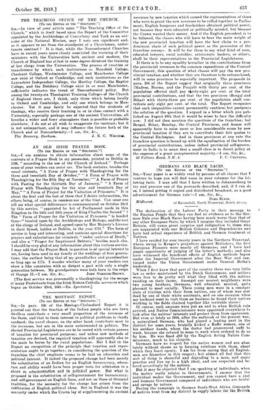THE MONTAGU REPORT.
[To THE EDITOR OF THE "SPECTATOR."] SIR,—In para. 136 of the Montagu-Chelmsford Report it is pointed out that the fraction of the Indian people who are town dwellers contribute a very small proportion of the revenues of the State, and that to them interest in political problems is chiefly confined; the rural classes, on the other hand, contribute most to the revenues, but are in the main uninterested in politics. The elected Provincial Legislatures are to be vested with certain powers of taxation for provincial purposes; and unless new methods of taxation are devised, the required taxation will apparently also in the main be borne by the rural populations. But I find in the Report no recognition of the principle that taxation and repre- sentation ought to go together; in considering the question of the franchise the chief emphasis seems to be laid on education and political interest. If indeed the proposed change had been merely the substitution of an Indian for an English bureaucracy, educa- tion and ability would have been proper tests for admission to a share in administration and in political power. But what is Proposed is the substitution of self-government for bureaucracy; and self-government on English lines, and not on those of Oriental tradition, for the necessity for the change has arisen from the infiltration of English political ideas. But in England it was the necessity under which the Crown lay of supplementing its ancient
revenues by new taxation which caused the representatives of those who were to grant the new revenues to be called together in Parlia- ment; English burgesses and freeholders obtained political power, not because they were educated or politically minded, but because the Crown wanted their money. And if the English precedent is to be followed, the classes who will have to bear the main weight of the new provincial taxation will have the best claim to a pre- dominant share of such political power as the possession of the franchise conveys. It will be for them to say what kind of men, educated lawyers, rural notables, aristocratic leaders, or others, shall be their representatives in the Provincial Legislatures.
If there is to be any equality hereafter in the contributions from the provincial revenues to the common expenditure of the Central Government, this question of what classes will pay the new pro- vincial taxation, and whether they are therefore to be enfranchised, will in some provinces be especially important. The proposals in para. 206 of the Report suggest that originally three provinces (Madras, Burma, and the Punjab) with thirty per cent. of the population affected shall pay thirty-eight per cent. of the total provincial contributions, and that the two provinces (Bengal and Bihar) with thirty-three per cent. of the population shall con- tribute only eight per cent. of the total. The Report recognizes that such inequalities cannot permanently continue, but postpones the solution of the question. I argued in a letter which you pub- lished on August 10th that it would be wiser to face the difficulty now. I did not then mention the questions of the franchise; but Bengal, Bihar, Bombay, the Central Provinces, and Assam will apparently have to raise more or less considerable BUMS by new provincial taxation if they are to contribute their fair quotas to the Central Exchequer. And in those provinces at any rate the franchise question is bound up with the equalization of the burden of provincial contributions, unless indeed provincial self-govern- ment in India is to mean that a small class is to direct policy at the expense of a great unreptesented majority.—I am, Sir, &c.,


































 Previous page
Previous page